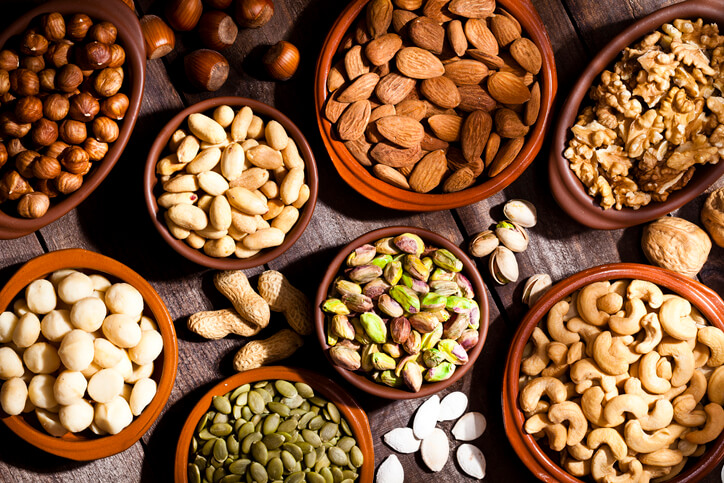
Go Nuts This Year!
By Joy Stephenson-Laws, JD, Founder
The holidays are over. So it’s that time of year when many of us are trying to stick to our New Year’s resolution of getting in better shape and getting healthier. Obviously, one aspect of staying healthy is being mindful about what we eat.
And one way to be more mindful about what we eat is to perhaps make the effort to include more nuts in our diets.
I came across a recent study which found evidence suggesting that increasing consumption of nuts such as almonds, Brazil nuts, pistachios, cashews, chestnuts, pecans and walnuts by 0.5 servings per day as replacement of less healthy foods such as processed meat, desserts, potato chips and french fries promotes less long-term weight gain and a lower risk of obesity.
(The researchers even saw this when the participants replaced some of their red meat consumption with nuts).
This study suggests that long term health is not just about eliminating or moderating less healthy foods. It’s also about adding in certain foods which may make you feel less deprived and more satisfied.
Even more reason to get excited about nuts?
Another recent study found evidence suggesting that nut consumption lowers the risk of fatal heart attack and stroke. Eating nuts just twice a week was linked to a 17 percent lower risk of death due to cardiovascular disease.
(And keep in mind that a healthy weight, which nut consumption may be able to help you achieve, lowers your risk of cardiovascular disease).
This is a big deal considering one person dies every 37 seconds in the United States from cardiovascular disease, according to the Centers for Disease Control and Prevention (CDC).
"Nuts are a good source of unsaturated fat and contain little saturated fat," said Dr. Noushin Mohammadifard of Isfahan Cardiovascular Research Institute, Iran, in this report discussing the study.
(To learn about the different types of fats, the good and the bad, check out this pH Labs blog).
"They also have protein, minerals, vitamins, fibre, phytosterols, and polyphenols which benefit heart health. European and US studies have related nuts with cardiovascular protection but there is limited evidence from the Eastern Mediterranean Region."
This particular study looked at nut consumption in the Iranian population. Some reports say that Iran may carry the highest burden of CVD in the Eastern Mediterranean Region.
Participants of the study included more than 5,000 Iranian adults (age 35 and older). None of the participants had a history of cardiovascular disease. Researchers took note of their intake of nuts, including walnuts, almonds, pistachios, hazelnuts and seeds (most nuts are considered to be seeds). Participants were also asked to complete food frequency questionnaires.
The participants (or their family members) were interviewed every two years over a time period of 12 years.
“The specific outcomes investigated were coronary heart disease, stroke, total cardiovascular disease, death from any cause, and death from cardiovascular disease,” according to the study report.
“During a median 12-year follow-up, there were 751 cardiovascular events (594 coronary heart disease and 157 stroke), 179 cardiovascular deaths, and 458 all-cause deaths.”
Keep in mind that this study included more than 5,000 people.
The results revealed that eating nuts two or more times per week was linked to a 17 percent lower risk of cardiovascular mortality compared to eating nuts just once every two weeks.
“The connection was robust even after adjusting for factors that could influence the relationship such as age, sex, education, smoking, and physical activity.”
The doctor referenced in the report recommends consuming unsalted, raw fresh nuts.
Ways to incorporate nuts into your diet.
Remember, the goal is to replace unhealthy foods (such as ultra-processed foods) with healthy-nutrient dense foods.
Craving something crunchy like potato chips or crackers?
Perhaps you might want to try a handful of nuts instead.
Need to shake up your salads a bit?
Throw a few almonds or walnuts over a fresh spinach salad.
Not much of a nut lover?
Try blending nuts into a fruit smoothie. You may not even know that they are in there!
I also love that nuts are easily portable. You can throw them in your gym bag or take them with you when you travel. Mix them with dried fruits such as prunes for a healthy, savory/sweet snack.
What if you have a nut allergy?
It’s unfortunate if we are allergic or have a food sensitivity to a certain healthy food. The good news is that there are so many delicious, healthy foods out there that also may benefit your heart and lower your risk of cardiovascular mortality. It’s really about the nutrients in these foods that can do wonders for your heart.
To learn about specific nutrients that may keep your heart healthy and which foods you can get these nutrients from, read here.
Finally, it is always good to speak with a competent healthcare professional about what foods you are including in your diet. This is especially important for pregnant women or women who are breastfeeding and for people who have existing health issues.
Keep in mind that nuts are high in calories, so you want to practice moderation. Measure your servings and keep track of your consumption throughout the week.
Enjoy your healthy life!
The pH professional health care team includes recognized experts from a variety of health care and related disciplines, including physicians, attorneys, nutritionists, nurses and certified fitness instructors. This team also includes the members of the pH Medical Advisory Board, which constantly monitors all pH programs, products and services. To learn more about the pH Medical Advisory Board, click here.







